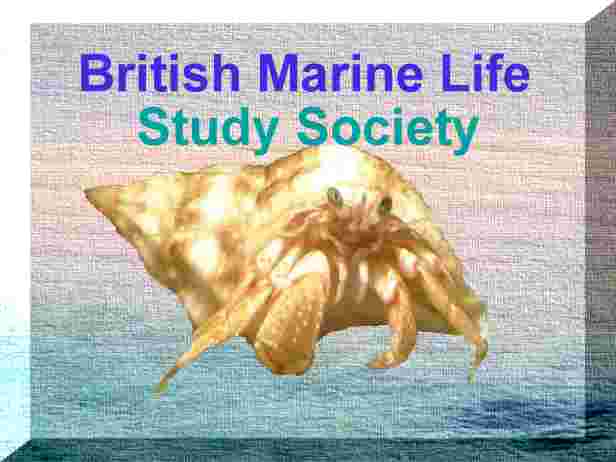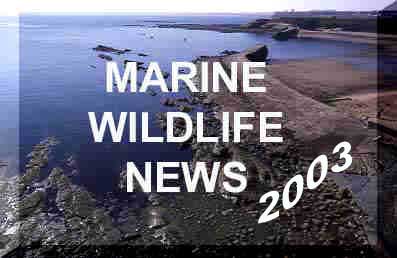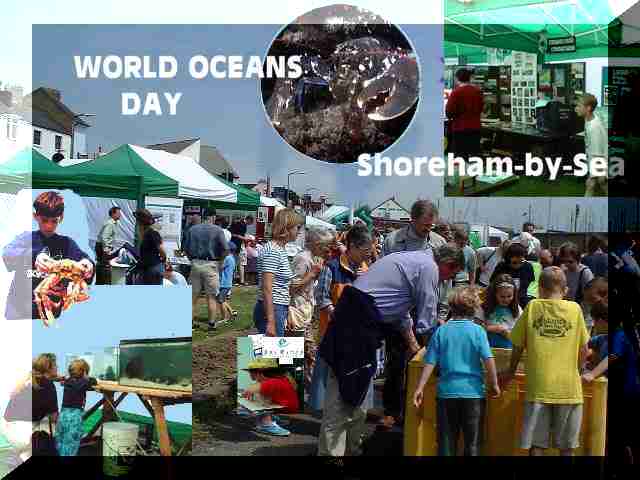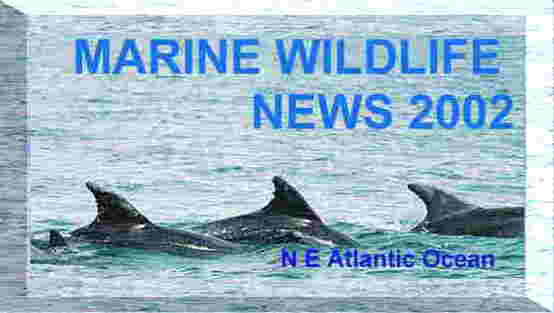-
|

|
Monthly
electronic news bulletin for the marine life of the NE Atlantic Oceans
including the seas around the British Isles.
The
bulletin is designed for Microsoft Explorer 4 and above using medium fonts
at a resolution of 800 x 600.
Subscribe
and unsubscribe options are at the foot of this page.
|
|
If
you receive this bulletin as an EMail subscriber, you may find the best
way to view the file is on your hard disc in your directory of Incoming
EMails.
|
| MARINE
LIFE NEWS
Reports
of marine wildlife from all around the British Isles, with pollution incidents
and conservation initiatives as they affect the flora and fauna of the
NE Atlantic Ocean.
-------------------------------------------------------------------------------------------------------------------------
27
September 2003
An
outlandish and completely unexpected addition to the Portland Island (Dorset)
mammal list came today in the form of a Harp
Seal, Pagophilus groenlandicus,
that was found hauled out on rocks along the East Cliffs at the Bill during
the afternoon; it remained there for three hours before being flushed off
by the incoming tide.
The
Harp Seal is an Arctic species that is hunted (cf. culled) in the frozen
north of Canada.
Report
on Portland Wildlife News
ORCA
(Organisation Cetacea) Report with previous sightings
BMLSS
Seals
20
September 2003
A
Swordfish has been reported stranded on
the Causeway to Worms Head, near Rhossilhi Beach, Gower peninsular in south
Wales. It lived for one hour.
NB:
this report has not been confirmed.
The
swordfish very occasionally reported in British seas is the Broad-billed
Swordfish, Xiphias gladius.
BMLSS
Swordfish
19
September 2003
Six
Risso's Dolphins, Grampus griseus,
were reported off Fermain, Guernsey, and later ten of these dolphins were
seen on a flat sea off Brehon Tower. Risso's Dolphins are only rarely reported
from around the Channel Islands.
Full
Report (La
Société Guernesiaise)
14
September 2003
Off
Worthing (West Sussex), on a shallow water dive site known as the Worthing
Lumps, a small school of Rock Cooks (Small-mouth
Wrasse), Centrolabrus
exoletus, were seen shyly swimming by
the rock face, quite unlike the bolder Corkwing,
Symphodus
melops (=Crenilabrus), and Goldsinny
Wrasse,
Centrolabrus rupestris.
The neon colours of the Rock Cook make
it look different to other wrasse: one side appears violet and the other
side orange.

Rock
Cooks (Small-mouth Wrasse),
Centrolabrus
exoletus
Photograph
by Paul
Parsons
These
inconspicuous wrasse have not been recorded off
the Sussex coast before and the books state that
is fish is only known from the southern and western coasts of Britain.
They may have been overlooked, but they are certainly not a common occurrence.
There have been no records of juvenile fish in Sussex rock
pools, where the Corkwing
first year fish are very common and Ballan
Wrasse, Labrus bergylta,
juveniles occasionally discovered.
BMLSS
Wrasse
Adur
Nature Notes 2003
10
September 2003
The
unusual orange European Lobster,
Homarus
gammarus, is put on display in
Guernsey
Public Aquarium in St. Peter Port.

Capture
Report (on-line)
5 September
2003
Five Risso's
Dolphins, Grampus griseus, were
seen off Botallack, Cornwall, including one youngster. They were heading
north towards Pendeen, half a mile off shore at noon.
This
dolphin does not habitually associate with boats so its frequency may be
greater than the occasional reports.
The Cornish
Mailing List contains numerous reports of cetaceans off the Cornish
coasts.
BMLSS
Cetacea
3 September
2003
A large
whale skull was landed at Shoreham
(Monteum's Wharf, River Adur) by fisherman Nick
Brown from a small (under 10 metres length)
trawler fishing three miles off Brighton Marina, Sussex.

Most
of the skull of a yet to be identified whale was dredged up approximately
3 miles SE of Brighton Marina by fisherman Nick Brown at 50°45'N, 0°05'W.
It
is at the Booth
Museum of Natural History, Brighton BN1 5AA where it will be cleaned,
prepared and put on display. As it is soaked in sea water, which has to
be leached out, covered in barnacles, smelly with cetacean fatty oil and
slightly damaged it will be at least nine months before this is possible.
We
do not know which species it is but think that it might be a juvenile
Sei or Fin Whale. A more positive identification
will be made when it can be safely turned over as it is currently up-side
down on a wooden pallet and is not safe to move.
Further
Details and Photographs
2 September
2003
A
small Ocean Sunfish, Mola
mola, approx. 50 cm nose to tail, was encountered in rough water
1/2 mile north of Whitehills harbour, Scotland, this afternoon. This harbour
is near Banff in NE Scotland. Sunfish are a newsworthy fish in this northern
part of the North Sea.
BMLSS
Sunfish
It
continues to be a very unique year here in the outer Moray Firth, NE Scotland.
Once again, the sea is boiling with fish (second wave of Mackerel
this year now running), Sandeels now even abound in the harbours,
and even reports of Sardines
and Anchovies
being caught by fishing boats! in addition to vast quantities of squid!
The
last five weeks of intensive squid trawling (see earlier reports to UK
Cetnet) have severely impacted the distribution
of cetaceans along the whole coastline at this
time. The Harbour Porpoises
are only just returning to this area at present with the dissipation of
trawlers and the numerous Minke Whales
previously in the area all headed out of the Moray Firth. Apart from a
single adult Minke Whale,
five miles off the coastline and a couple of juvenile encounters, there
have been no confirmed Minke Whales
encounters since 12 August 2003.
August
2003
Two
Gilthead
Bream, Sparus aurata, of
1.66 kg & 1.7 kg were caught by angler
Colin Mills off the south coast of Cornwall.
These southern fish are increasingly being reported off the coast of Cornwall,
and if the trend continues, their capture will cease to be newsworthy.
8-9
August 2003
Whilst
travelling out from Littlehampton marina on Friday night, we passed four
very large Rhizostoma octopus
and counted 21 Compass Jellyfish, Chrysaora
hysoscella, over a period of an hour.
On
Saturday morning we went armed with cameras. Within 20 minutes we had found
three Rhizostomas. The last two were close enough to see the juvenile
fish, Probably Scad,
Trachurus
trachurus, swimming alongside. We dived with
the third Rhizostoma for about 30 minutes. It stayed within the
top three metres of water. We saw a third as we headed back to the marina
on a different heading.
Link
to the Image by Paul Parsons (Aquapix)
We
also spotted eight Compass Jellyfish, which
are known from the sea of Sussex but only occasionally.
BMLSS
Jellyfish
|

NEW
INTERNET DOMAIN
The
British
Marine Life Study Society has changed its main Internet Universal Resource
Locator (URL) under a new easier to remember domain name:
The
old URLs are expected to eventually fall into disuse, and from year 2004
there is no guarantee that the old links will work. This poses a problem
as many other web sites and search engines are linked into to the old URLs,
and the new URLs cannot be found on the commonly used search methods like
Google
and Copernic. Already
the latest News items are only to be found on the new domain. The changeover
was necessary because the CompuServe system was old fashioned and essential
because it still cannot be accessed via Broadband. The new domain does
not officially commence until the deadline for the broken links to be repaired
and the missing images to be renewed which is 1
January 2004. Please amend your bookmarks
for the News pages immediately.
Marine
Wildlife News of the North-east Atlantic Ocean 2003
(British
Marine Life Study Society)
News2003.htm
News2003Autumn.htm
It
would probably be best to amend your book marks for the other pages as
well. If you are a webmaster, please adjust the links before the end of
2003.

|
| PICTURE
GALLERY
Each
month, at least one special marine image will be published from images
sent to the BMLSS. This
can be of the seashore, undersea world or any aspect of the marine natural
world, especially the underwater life, but not restricted to life beneath
the waves. Topical inclusions may be included instead of the most meritorious,
and images will be limited to the NE Atlantic Ocean and adjoining seas,
marine and seashore species and land and seascapes.

Rhizostoma
octopus (=R. pulmo)
Photograph
by Paul
Parsons
9 August
2003
Within
20 minutes we had found three Rhizostomas off Littlehampton, Sussex.
The last two were close enough to see the juvenile fish, probably Scad,
Trachurus
trachurus, swimming alongside. We dived with
the third Rhizostoma for about 30 minutes. It stayed within the
top three metres of water. We saw a third as we headed back to the marina
on a different heading.
|
-------------------------------------------------------------------------------------
Shore
Topography Series
The
name of the particular coast should be included and the grid reference,
if known. Print photographs can be included in Exhibitions
and on the BMLSS Web Sites and electronic publications. Electronic images
in *.JPG format can also be considered for the web site. They should not
exceed 150K in size.
Shore
Topography Portfolio
-----------------------------------------------------------------------------------------------------------------------------
| |
26
September 2003
The
inlet pipe to
Widewater
Lagoon has not been detrimental to the autumn Glasswort,
Salicornia,
as if anything the splendid and unusual scarlet fringe to the lagoon is
even more dramatic than usual.

Red
Glasswort by the Inlet Pipe
Widewater
Lagoon (September 2003)
The
Salicornia
has not been identified to species level.
It
may be Salicornia ramosissima.
|

Mueller's
Pearlside, Maurolicus muelleri
on
a night dive in one of Norways deep fjords
Photograph
by Rudolf Svensen
It
is a quite common fish in Norway, but seldom spotted by divers. They mostly
catches it in prawn trawls. It is a mesopelagic fish. That is it travels
in the great open waters. During the day it usually is found from 100 metres
down to 300 metres. It follows the dusk towards the surface where it hunts
using its eyesight.
When
its dark, it sinks down but moves towards the surface again in the morning.
We
have made several pelagic dives to find it with no luck, but then it suddenly
appeared there during this night dive.
It
has rows with light organs along its stomach and is quite a sight.
More
Pearlside Images on Smart Groups

Underwater
Photography in Norway |
-----------------------------------------------------------------------------------

Click
on the album for more links (On-line link)

| WORLD
OCEANS DAY
In
June 1992, over 150 Heads of States signed the Convention on
Biological
Diversity at Rio de Janeiro. They did so to express a shared belief
that action must be taken to halt the worldwide loss of animal and plant
species and genetic resources.
World
Oceans Day was first declared as 8th June at the Earth Summit in Rio de
Janeiro in 1992.
Events
will occur all around the world on and around this day.
|
|
| DIARY
In
chronological order, the most recent events are at the top of the page.
Events open to the public, free or for a nominal charge only are included.
Most Seminars need to be booked in advance.
----------------------------------------------------------------------------------------------------------------------------
11
October 2003 (Saturday)
SHOREHAM
FISH FESTIVAL

Coronation
Green, Shoreham-by-Sea,
West Sussex
FREE ADMISSION
LOCAL
FISH AND SHELLFISH ON SALE

FISH
COOKING DEMONSTRATIONS
LOCAL
FISH TASTINGS
This
event is organised and run by Shoreham Fisheries Project
P
O BOX 12, BRIGHTON, BN41 1WW
Email:
shorehamfish@fsmail.net
The
British
Marine Life Study Society will present a live exhibit and an information
display at this event.
-----------------------------------------------
BIOSIS
Conference Calendar for Zoology
(Major
Link of all biological conferences around the world)
-----------------------------------------------
---------------------------------------------------------------------------------------------------------------------------------
Plymouth
Spring Talks Series
2003
No
talks are listed. Facilities are available for schools, linked to
the national curriculum.
All
talks are on Tuesdays and start at 7:00 p.m.
at
the National Marine Aquarium,
Coxside, Plymouth Devon.
Admission
– Adults £2.50; Children and NMA members £1.50, inclusive of
refreshments will be available.
Please
reserve your place by calling the Aquarium on 01752 275204
----------------------------------------------------------------------------------------------------------------------------
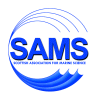 SAMS
Seminar Series SAMS
Seminar Series
The Scottish
Association for Marine Science (SAMS)
Dunstaffnage Marine Laboratory, Dunbeg,
Oban, Argyll PA37 1QA
Tel: 01631 559000 Fax: 01631 559300
Email: mail@dml.ac.uk
For more details/how to find SAMS
see our website: http://www.sams.ac.uk
Unless otherwise stated, seminars
are held on Fridays at 4:15 pm
in the SAMS Conference Room
** Followed by the Friday R&R **
For
more details on the forthcoming talks, please contact Murray
Roberts or Anuschka Miller
Tel: 01631 559 000
30
October 2003
Scottish
Marine Group autumn meeting at the University of Stirling. For information
contact Dr Hamish Mair or
or Anuschka Miller Tel: 01631
559 000
----------------------------------------------------------------------------------------------------------------------------

A
series of monthly talks on marine conservation topics
These
talks are open to the public, admission is free.
2 October
2003
ROV
deep sea fish watching – Ian
Hudson
6 November
2003
Turtles
– John Houghton
4 December
2003
Sea
Mounts – Kerry Howell
The
Marine
Life Talks are held on the first Thursday of the month at 7.30
pm, please arrive at 7.15 pm to be met in
Reception. Southampton Oceanography Centre is reached via Dock Gate 4 (between
Town Quay and Ocean Village).
----------------------------------------------------------------------------------------------------------------------------
BRITISH
PHYCOLOGICAL SOCIETY
47
January 2004
Lancaster University, UK
The
52nd Annual Meeting of the BPS will take place on the campus of Lancaster
University, just south of the beautiful English Lake District. We invite
anyone with an interest in algae to attend and promise a full range of
scientific and social programmes for you to enjoy.
Scientific
Programme
This
years Founders Lecture will be given by Rick Wetherbee, University of
Melbourne.
The Special Topics are 'Cell Signalling in Algae' and 'Macroalgae
in
Medicine' but submissions on any other aspects of phycology are welcome.
Students
Take Note
Attendance
at this conference is (almost) free if you are a member and present a paper.
Cash prizes are available for the best poster (BPS Prize) and the best
oral presentation (Manton Prize), so please indicate your interest in the
competitions at the time of abstract submission.
Abstract
submission deadline: 30 September 2003
Registration
deadline: 1 December 2003
For
more information about this conference, or general information regarding
the
BPS, please contact Jackie Parry
or visit the website http://www.brphycsoc.org |
| NEW
PUBLICATIONS & WEB PAGES
21
August 2003
'Atlas of cetacean
distribution in north-west European waters'
The
publication by the Joint Nature Conservation Committee (JNCC) of an atlas
of their distribution in waters off north-western Europe. It is based
on the sightings made by hundreds of observers over the past 25 years.
The atlas is a first for these waters, and becomes the first globally to
take full account of the variation between areas in the amount of searching
that observers have carried out to gather the information.
Click
on this text for the full information including ordering
Price
£17.00 from the Natural History Book Service (www.nhbs.com),
or
phone +44 (0)1803 865913.
------------------------------------------------------------------------------------------------------------------------
SHRIMPING FOR
FOOD AND FUN
 Local
shrimper Peter Talbot-Elsden, from Southwick (Sussex),
has produced a small booklet called “Shrimping for Food and Fun”
about catching the brown shrimp around the coasts of Britain. The shrimps
are caught in nets and the book features the various methods, firstly the
push-netting seen over the sand in shallow water in spring off the Sussex
coast. The famous Morecambe Bay shrimps were originally captured by cart
shanker shrimping with a horse and cart in deeper water off the Lancashire
coast, later replaced by a tractor. At Formby, they experimented with amphibious
vehicles after World War II. Nowadays, most commercial shrimping on the
east coast around King’s Lynn trawls from small boats using a net off the
stern. Shrimps are often cooked on board. Local
shrimper Peter Talbot-Elsden, from Southwick (Sussex),
has produced a small booklet called “Shrimping for Food and Fun”
about catching the brown shrimp around the coasts of Britain. The shrimps
are caught in nets and the book features the various methods, firstly the
push-netting seen over the sand in shallow water in spring off the Sussex
coast. The famous Morecambe Bay shrimps were originally captured by cart
shanker shrimping with a horse and cart in deeper water off the Lancashire
coast, later replaced by a tractor. At Formby, they experimented with amphibious
vehicles after World War II. Nowadays, most commercial shrimping on the
east coast around King’s Lynn trawls from small boats using a net off the
stern. Shrimps are often cooked on board.
The
28 page book contains 40 photographs of shrimping through the ages. It
is available through Bookworms of Shoreham
and other booksellers and museums at £3.50.
The
booklet is also available through the British
Marine Life Study Society, but at £4 including postage and packing.
--------------------------------------------------------------------------------------------------------------------
WEB
SITE
EurOcean
(European
centre for information on marine science and technology)
-------------------------------------------------------------------------------------------------------------------
PUBLICATIONS
Assessing
the sensitivity of seabed biotopes to human activities and natural events
MARLIN
(Marine Life Information Network)
+ MarLIN News
Issue 6 Spring 2003
Sealife
Surveys: Identification Guide for Selected Underwater Species
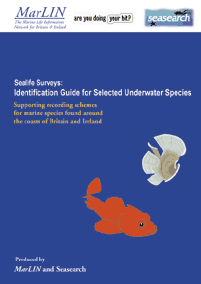 MarLIN
has published this new waterproof guide which is designed to support recording
projects. The 45 species in the guide have been selected for their ease
of recognition and their importance as species which play a key role in
maintaining particular communities, are likely to be affected by global
warming, or are non-native. The guide is produced in collaboration with
the Seasearch programme, which is a nationwide diving survey of underwater
habitats and species. Volunteers are taught about marine life, how to recognize
what's important and how to make records under water. MarLIN
has published this new waterproof guide which is designed to support recording
projects. The 45 species in the guide have been selected for their ease
of recognition and their importance as species which play a key role in
maintaining particular communities, are likely to be affected by global
warming, or are non-native. The guide is produced in collaboration with
the Seasearch programme, which is a nationwide diving survey of underwater
habitats and species. Volunteers are taught about marine life, how to recognize
what's important and how to make records under water.
You
can obtain a copy of the guide for £3 including post and packing
by sending a cheque to MarLIN, Marine Biological Association, Citadel Hill,
Plymouth PL1 2PB. Cheques are to be made payable to ‘Marine Biological
Association’. Copies are free to participants in organized surveys.
-------------------------------------------------------------------------------------------------------------------
RESOURCES
CENTRE
The
Marine Life and Environmental Sciences Resource Centre
The Marine Life
and Environmental Sciences Resource Centre
The
Marine Life and Environmental Sciences Resource Centre is based at the
historic Citadel Hill Laboratory of the Marine Biological Association on
Plymouth Hoe. The Association was founded to investigate life in the sea
and disseminate the knowledge gained for the public good.

The
Centre is designed for a variety of educational and training purposes in
support of the local, national and international community, including charities,
small and medium-sized businesses, schools and colleges, universities and
learned societies.
The
Centre provides a spacious and flexible venue combining facilities for
workshops, conferences and lectures with laboratory benching and equipment
for practical work and field courses. The Centre can be partitioned into
connecting meeting and laboratory areas or remain as one large space. The
following resources are available:
Seminar,
workshop and lecture facilities for up to 80 people
Fully
equipped laboratory holding up to 40 participants (inventory available
on request)
Seminar
area convertible into laboratory space giving one large lab. capable of
holding up to 80 students
Digital,
slide and overhead projectors
Networked
computing facilities
Display
and poster boards
Access
to the National Marine Biological Library
Seawater
systems
Boats
and sampling equipment
Easy
access to a wide range of marine habitats including estuaries, rocky and
sandy shores and open water
Close
proximity to local diving services
Catering
facilities for tea and coffee, buffets, formal lunches and dinners
Disabled
access and toilet facilities |
|
Marine
Biological Association of the U.K.
-------------------------------------------------------------------------------------------------------------------
| GREAT BRITISH MARINE ANIMALS |
by Peter Naylor |
published
by
Sound
Diving Publications |
ISBN 0
9522831 4 X |
| Available from |
 |

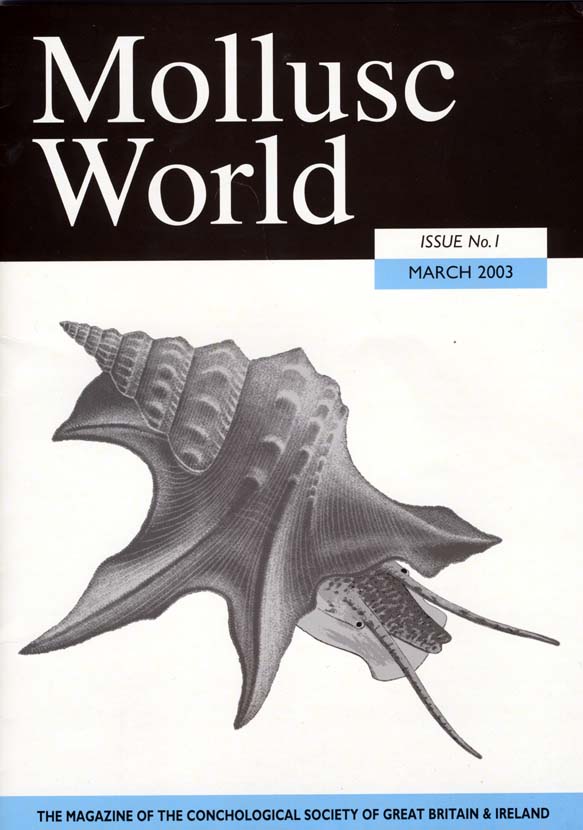
Published by the Conchological
Society
|
SOCIETY
INFORMATION
The
British Marine Life Study Society are responsible for producing the journal
GLAUCUS,
which is the first publication exploring the marine life of the seas surrounding
the British Isles available to the general public.
----------------------------------------------------------------------------------------------------------------------------
Change of EMail
Address
 Please
note that the EMail address for messages to the British Marine
Life Study Society has now changed Please
note that the EMail address for messages to the British Marine
Life Study Society has now changed
from
bmlss@compuserve.com
to Glaucus@hotmail.com
Messages
to the first address will not receive any guarantee of a reply and from
year 2003, the old EMail address is expected to fall into disuse.
----------------------------------------------------------------------------------------------------------------------------
Membership 2003
Current
members will
have their subscriptions waived for year 2003. An explanation was sent
before Christmas. This is because of he computer breakdown and the failure
of the full complement of paper publications.
|
|
Bulletin
Details
If
you receive this Bulletin direct from the British Marine Life Study Society
it will contain only hypertext and image (*.htm *.gif & *.jpg) files.
Recipients
can only unsubscribe if the Bulletin is received directly from the
BMLSS.
Permission
is granted to forward the Bulletin on unaltered. However, you will have
to include the images separately.
Subscribe/Unsubcribe
http://groups.yahoo.com/group/BMLSS-Torpedo
To
save download times, only new images are included with each Bulletin.
The
Bulletin is designed to be viewed on Internet Explorer using medium
fonts
at
a resolution of 800 x 600.
Viewing
should be possible on Netscape and other browsers.
|
|
Printing
the two column version of Torpedo (from issue 28)
These
pages are not designed for the default settings on the Page Set-ups of
your browser. I recommend viewing in Microscope Internet Explorer 6 and
altering the right and left hand columns in the Page Set-up menu to 9 mm
(from 19 mm).
The
page set-up can also be amended in Netscape Composer and other web page
editors, and this has the advantage of enabling the specified number of
pages to be printed and the information about the file (name, path, date)
to be deleted.
Some
of the images may not display if you have changed your directory for downloaded
files. The images may also not display properly if your settings on your
EMail software do not allow you do this automatically. When received in
Pegasus the format is changed slightly, but the bulletin is still readable.
|
---------------------------------------------------------------------------------------------------------------------------------
Compiled
on Netscape Composer 4.7 and other programs
|
